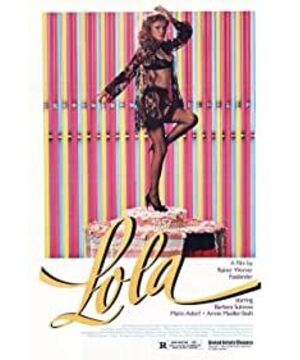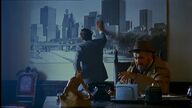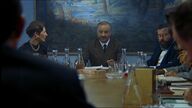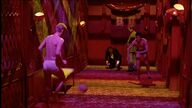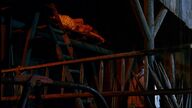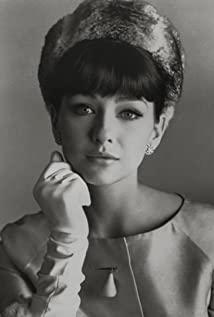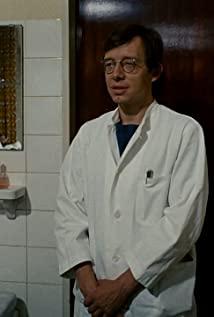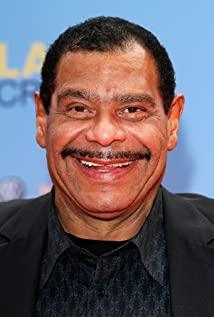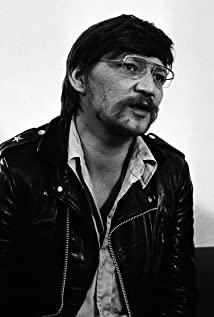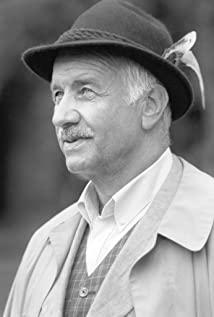Fassbender can always design a bright ending that cannot satisfy you. How dissidents transform the world is no longer the focus of the story. How society successfully absorbs dissidents really becomes Fassbinder’s irony. bright.
"Lola" is not a very good part of the Fassbinder German trilogy, but it clearly illustrates the degeneration and corruption of German society at that time. The film background is set in Germany in the post-war 1950s. The power structure established by the economic miracle under Denner's rule permeated every corner of German society. The scenes in the play basically appear in the government, brothels, and families. These spaces have gathered a lot of melodramatic tension, but Fassbinder did not take advantage of the trend to make the tension erupt to a climax. He adopted a form of irony from beginning to end. With stylized colors, exaggerated character settings, and isolated electronic soundtracks, we find that Fassbender is no longer more interested in how dissidents transform the world, but how society successfully absorbs dissidents. Fassbinder’s irony reached its climax when the audience discovered that von Bern’s lust drive was stronger than his sense of responsibility for the democratic system that gave him power.
The story of "Lola" is a variation on Henrich Mann's 1905 novel "Professor Trash", which was adapted by Joseph von Steinberg into his 1930 classic "The Blue Angel". In the adaptation, Steinberg weakened the social critical consciousness of the original book, and the professor was more like a victim under Lola's sock. In contrast, Fassbinder’s "Lola" sets Lola and von Berne to be more three-dimensional. Lola is no longer just an object of eroticism, she is a mixture of innocence and viper, von Bo En is no longer a simple image of a weak person. When he is tempted, he enjoys fragility and satisfaction at the same time. The relationship between sex and politics, the ambiguity between ideals and reality are all ironic in a differentiated duality. Even at the end of the film, all the characters get what they desire most. Schuckert can continue the money-making plan blocked by von Berne. Laura married von Byrne and received a generous wedding gift from Schucker-Fink Villa. Except for von Berne's integrity and his hope of becoming Lola's only man, there is no irreparable loss. This "bright" ending envelops both Lola and von Berne: Lola got rid of her status as a prostitute and gained the wealth she pursued, but in the future his charm will gradually disappear, and his emptiness will only become more intolerable. ; Von Byrne thought that he had obtained and controlled Lola's body and spirit with great pains, but in the future, as long as lies are exposed, the collapse of values will inevitably tear him apart.
This also corresponds to what Fassbinder himself said: "A director can always design a bright ending that cannot satisfy you."
The only Shukert in the film who is firm in his values from beginning to end. He is cynical and venomous. He is the opposite of "moral model". Because von Berne has been immersed in the so-called decent power mechanism for many years, once he comes into contact with something outside the scope of self-perception-Lola, he is in a hurry and has no power to fight back. And Schuchter is not only a participant in the decent authority (the government), but also the initiator of the reactionary mechanism (the brothel). He has not been disciplined by power, and he regards power as a tool he can use. Von Berne and Schucker’s attitude towards the power mechanism are two extremes. Of course, Fassbinder does not advocate that we deceive and play with others like Schucker, and turn order into a means. He does not want us to be like Von. • Like Byrne, he becomes an ignorant person disciplined by the environment and society. This also confirms Fassbinder’s view on fascism: he believes that fascism is a potential condition for middle-class life, not just under the leadership of the Nazi Party, nor just in Germany. He believes that fascism can only be prevented through self-awareness, and the self-awareness of von Berne and Schuckert has the potential of fascism to a certain extent. He hopes to realize the self-consciousness of the people through the vigilance on the screen, rather than the social revolution in real life.
In addition to the irony in the story, the unique arrangement of lighting and music also creates a sense of "bright" irony. Following Douglas Seck's preference for unnatural light, Fassbender used a lot of unnatural light such as red, blue, and green in "Lola". Laura and von Byrne are sitting in the car to end their day’s date. The cool blue light envelops von Byrne, the warm red light reflects Laura’s enthusiasm, and the blue and red colors further divide a confined space. , The unrealistic sense of separation of the two identities floods the screen. "You are not corrupt, that's why you don't belong to this city... When I further reveal my soul to you, I should go." What Laura said to von Berne further clarified her own and Von Bern’s difference from color to identity. She stepped out of the car, standing alone in the darkness in the background, von Byrne and Lola looked at each other, the camera moved 180 degrees around the two of them, and at the same time, von Byrne walked into Lola's red In the world, the movement of space seems to lead to the reconciliation of identities. Then, the lights of the car in the distance shot at the two close friends mercilessly, forming an effect similar to "overexposure", which is nothing to Lola. And von Berne’s ironic "brightness" foreshadowing.
The music of this film comes from Fassbinder’s queenly soundtrack Pierre Raben. Whenever von Bern’s desire for Lola comes to his heart, a violin concerto with the ultimate and blurred love of love will appear. . What's interesting is that Wong Kar-wai, who is very picky about music, even copied this accompaniment of Raben in the 2005 short film "Hands of Eros" (Raben also participated in the soundtrack of Wong Kar-wai’s "2046"), which shows that Raben’s musical talent. However, Raben was not a professional film scoring master at first, he was a theater actor and director when he was young. Sophocles's "Antigone" drama adapted by Raben in the Action Theater deeply attracted Fassbinder, who had just been involved in the field of drama and film. What happened on the stage made him very excited, and he nominated himself. Started to work in the action theater, and began a relationship with Raben, so Raben, Fassbinder, and Emma began a strange love triangle. When Fassbender moved into Emma’s one-room apartment , Raben moved in randomly to live with them. In terms of work, Raben and Fassbender co-directed the two dramas "Engstad" and "Foreign Worker" in the anti-theatre. The gentle-natured Raben hates dispute scenes very much. He is not like Fassbinder. De has a strong desire to control, so he gradually became an ally of Fassbinder rather than a evenly matched opponent. Raben had received orthodox music training. Before he knew it, his original role as an actor and director in the theater was converted by Fassbender to a mere composer. He began to become a Fassbender film. The Queen’s soundtrack, he himself has gradually begun to enjoy this new identity.
View more about Lola reviews


